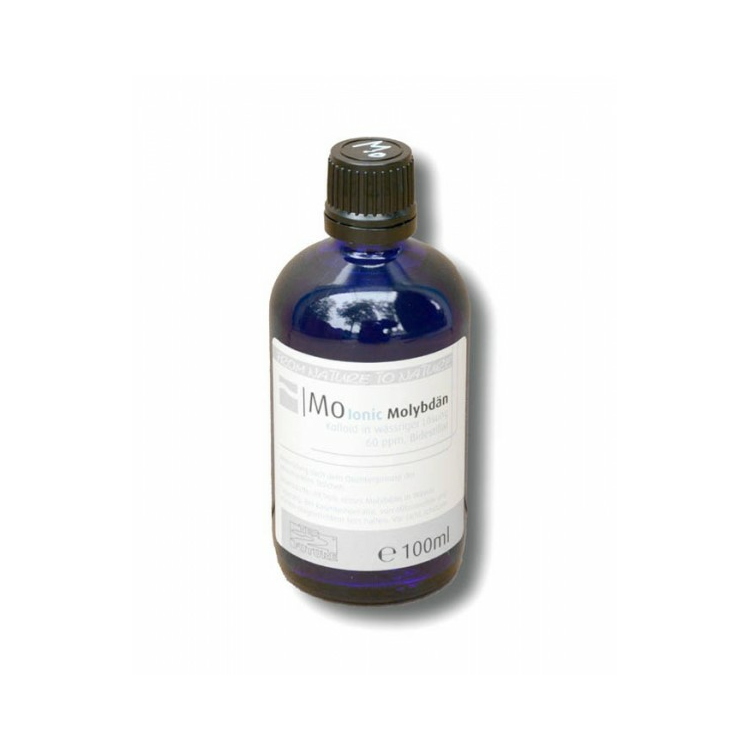Colloidal Molybdenum (Mo) 100ml
43,90 € incl. 19 % Basket VAT
Colloid in aqueous solution, 60 ppm, double distillate Ingredients: 99.99% pure molybdenum in aqueous solution
Art no.: KollMo100
Description
Colloidal Ionic Moblydenum (Mo) 100ml
Molybdenum is a relatively hard but brittle heavy metal. In the periodic table of the elements it has the atomic number 42 and the chemical symbol Mo. In its pure form it has a colour comparable to tin. It oxidizes in air. At low temperatures it is superconducting. It is the 39 most common element in the Earth's mantle.
The first production of the metal was in 1781 by the Swedish chemist Peter Jakob Hjelm (1746-1813). The name is derived from the Latin term "molybdaena" for galena, as at that time it was not possible to distinguish galena from molybdenum. In nature it does not occur in elementary form.
Keywords:
Antioxidant
Potency, fertility
Gout
Teeth
The human body contains about 10mg molybdenum, mainly in the skeleton, as well as in the internal organs and skin.
Functions in the body
As a cofactor, molybdenum supports a number of important enzymes in the metabolism, especially those that are responsible for the degradation of nitrogenous or sulphur-containing compounds.
These include, for example, amino acids which are broken down to urea.
Two examples of enzymes that have incorporated molybdenum (together with iron) into their structure and active centres are xanthine oxidase and aldehyde oxidase. The xanthine oxidase is involved in the purine metabolism and leads to the formation of the end product uric acid. The aldehyde oxidase is responsible for the breakdown of alcohol in the liver.
Furthermore, molybdenum has a very positive effect on certain forms of impotence - inadequate sexual function of men and infertility can be eliminated in isolated cases by combined administration of molybdenum-zinc.
Molybdenum promotes the breakdown of purines - gout. It promotes fluoride incorporation into the teeth.
In addition to its function in metabolism, molybdenum is a component of the teeth. It has a bacteriostatic effect here, i.e. it inhibits the growth of bacteria.
Need
The German Society for Nutrition (DGE) states the daily requirement of molybdenum with 50 to 100 μg for children from the age of 12 and adults.
An additional requirement of molybdenum may be necessary for some inflammatory bowel diseases such as Crohn's disease and ulcerative colitis or for absorption disorders. Furthermore, a deficiency can result from anorexia or prolonged artificial nutrition.
Symptoms of deficiency
A deficiency may favour the development of caries, as molybdenum is involved in the incorporation of fluorine into the teeth. Among other things, uric acid plays an important role in the organism in the chemical bonding of free radicals. A molybdenum deficiency leads to a reduction in the concentration of uric acid and thus increases the load of free radicals on the cells, which can cause mutations in the DNA.
Disturbances also occur in the amino acid metabolism, whereby the breakdown of toxic sulphurous amino acids is reduced. The purine metabolism is also disturbed and there is an accumulation of xanthine, which is normally converted to uric acid by xanthine oxidase. If the xanthine concentration is increased, xanthine stones can be formed in the kidney.
In addition, a number of unspecific symptoms such as excitability, night blindness, shortness of breath, itching or nausea can develop.
Although this trace element is only present in our body in extremely low doses (approx. 0.2 μg in the entire body), it is an important link for other trace elements. Without molybdenum, for example, iron cannot be sufficiently utilised by the body.
In addition, this rare trace element is an important component of several enzymes for sulphur utilisation, purine metabolism (important for the breakdown of uric acid) and for the smooth running of energy processes in the cells. Molybdenum is used to activate essential enzymes, e.g. xanthine oxidase, which is important for the detoxification of the kidneys.
Molybdenum regulates the pH value in the body. Per 0.1 increase (e.g. 6.1 to 6.2) the oxygen level is raised by a factor of 10. This results in better fat burning.
Molybdenum deficiency can cause the following complaints:
- bad general condition
- Heart Chase
- Increased breathing frequency
- Night blindness
- Excessive nervous excitability
Application for the optimal absorption of colloidal molybdenum:
The above-mentioned effect can be achieved by taking ½ tsp. once a day in the evening with a glass of water at mealtimes. The intake period should be at least 10 weeks. As with all other colloids, try it yourself, not every body reacts in the same way. The spoon used should be made of plastic or wood (no metal!).
100ml bottle 60 ppm
Technological production from pure molybdenum
EUR 43,90
Ready for dispatch in 2 - 3 days
Resellers welcome (with trade licence or practice certificate)
For a personal consultation please call 09434 3029 (Mon-Fri, 10-16 hrs).
Legal notice: Essences and oscillating agents are food within the meaning of Art. 2 of Regulation (EC) No. 178/2002 and have no direct effect on the body or psyche proven according to classical scientific standards. All statements refer exclusively to energetic aspects like aura, meridians, chakras, etc.
